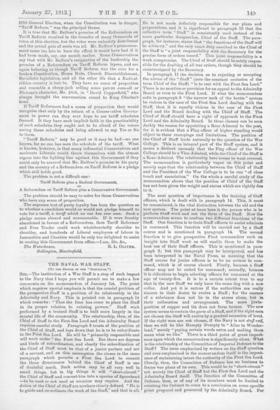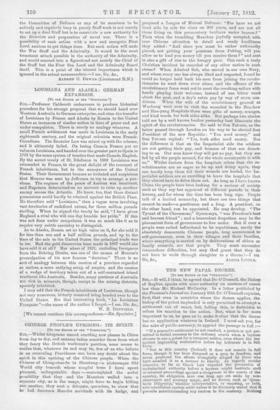THE NAVAL WAR STAFF.
Ivo TWA EDITOR OF TRIO " EDROTATOR."1
BIR,—The institution of a War Staff is a step of such import to the Navy that I hope you will permit me to make a few comments on the memorandum of January 1st. The point which requires special emphasis is that the crucial problem of the prospective Staff is a problem of its relationship to the Admiralty and Navy. This is pointed out in paragraph 14 which remarks : "That the time has come to place the Staff in its proper relation to existing powers." Staff work performed by a trained Staff is to bulk more largely in the mental life of the community. The relationship, then, of the Chief of Staff to the First Sea Lord and the Admiralty Board requires careful study. Paragraph 8 treats of the position of the Chief of Staff, and lays down that be is to be subordinate to the First Sea Lord. He will be "primarily responsible and will work under" the First Sea Lord. But there are degrees and kinds of subordination, and clearly the subordination of the Chief of Staff must be that of a junior partner and not of a servant, and on this assumption the clause in the same paragraph which permits a First Sea Lord to consult the three directorates behind the Chief of Staff is one of doubtful merit. Such action may be all very well in small things, but in big things it will " short-circuit " the Chief of Staff and convert him into a species of figurehead —to be used or not used as occasion may require. And the duties of the Chief of Staff are nowhere clearly defined. "11 is to guide and co-ordinate the work of the Staff," and that is all. He is not made definitely responsible for war plans and preparations, and it is significant in paragraph 10 that the collective term " Staff " is consistently used instead of the more particular designation, Chief of the Staff. The para- graph, for instance, states that "the functions of the Staff will be advisory," and the only exact duty ascribed to the Chief of the Staff is "a joint responsibility with the Secretary for the precise form of orders issued." This joint responsibility is a weak compromise. The Chief of Staff should be solely respon- sible for the drafting of all 'war orders, though they should he countersigned by the Secretary.
In paragraph 11 the decision as to rejecting or accepting the advice of the "Staff" (note the constant occlusion of the term Chief of the Staff) "is to rest with the First Sea Lord." There is no mention or provision for an appeal to the Admiralty Board or even to the First Lord. If what the memorandum calls in paragraph 8 "the narrow neck of the bottle" system be vicious in the case of the First Sea Lord dealing with the Staff, then it is equally vicious in the case of the First Lord and the Board dealing with the Chief of Staff. The Chief of Staff should have a right of approach to the First Lord and the Admiralty Board. In these clauses can be seen darkly the reason for appointing a Rear-Admiral to the poet, for it is evident that a Flag officer of higher standing would object to these crampings and limitations. The position of the Chief of Staff leads naturally to the question of the War College. This is an integral part of the Staff system, and it seems a distinct anomaly that the Flag officer of the War College should be a Vice-A din iral, while the Chief of the Staff is a Rear-Admiral. The relationship here seems to want reversaL The memorandum is particularly vague on this point and merely says that the relationship between the Chief of Staff and the President of the War College is to be one of close touch and association." On the whole a careful study of the memorandum shows that the position of Chief of the Staff has not been given the weight and status which are rightly duo to it.
The next question of importance is the training of Staff officers, which is dealt with in paragraph 14. This, it must be remembered, is the vital distinction between the old and the new system. The point at issue here is the person who is to perform Staff work and not the form of the Staff. Now the memorandum seems to confuse two different functions of the Staff. One function is to train Staff officers to assist admiral. in command. This function will be carried out by a Staff course and is mentioned in paragraph 14. The second function is to give prospective Fleet commanders such an insight into Staff work as will enable them to make the best use of their Staff officers. This is mentioned in para- graph 2; but this paragraph may be interpreted, and has been interpreted in the Naval Presa, as meaning that the Staff course for junior officers is to be an avenue to com- mand, which is of course absurd. Firstly, because a Staff officer may not be suited for command; secondly, because it is ridiculous to begin selecting officers for command at the age of twenty-five. It is to a certain extent true to say that in the new Staff we only have the same dog with a new collar. And yet it is untrue if the authorities are really sincere in their desire to evolve a Staff ; for the essence of a substance does not lie in the atoms alone, but in their collocation and arrangement. The mere juxta-- position of copper and tin does not form bronze. The new system seems to contain the germ of a Staff, and if the right men are chosen the Staff will evolve by a gradual ascension of level. If the right men are not chosen, if the Navy is not staff-reif, then we will be like Humpty Dumpty in "Alice in Wonder- land," merely "paying certain words extra and making them mean what we like." There is a third point of great import- ance upon which the memorandum is significantly silent. What is the relationship of the Committee of Imperial Defence to the Staff P The issue emphasized by writers on the Staff question and over-emphasized in the memorandum itself is the import- ance of maintaining intact the authority of the First Sea Lord. Clearly, then, the Committee of Defence has no business to frame war plans of its own. This would be to "short-circuit" not merely the Chief of Staff but the First Sea Lord and the Admiralty Board itaelf. The function of the Committee of Defence, then, or of any of its members must be limited to assisting the Cabinet to come to a conclusion on some specific: point proposed and presented by the Admiralty Board. For
the Committee of Defence or any of its members to he actively and regularly busy in purely Staff work is not merely to set up a dual Staff but is to constitute a new authority for the direction and preparation of naval war. There is a possibility of such action with a new and energetic First Lord, anxious to get things done. But such action will undo the War Staff and the Admiralty. It would be the most trenchant attack possible in the authority of the Admiralty, and would convert into a figurehead not merely the Chief of the Staff but the First Sea Lord and the Admiralty Board itself. This is a point of the utmost importance which is ignored in the actual memorandum.—I am, Sir, &a, Lumen C. DEWAR (Lieutenant R.N.).























































 Previous page
Previous page